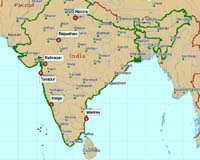 |
Berlin (UPI) Aug 30, 2010 German Chancellor Angela Merkel said the country's reactors could run for another "10 to 15 years," in her first concrete comments on the length of a potential running time extension of the 17 German nuclear power plants. This is the extension that makes technical sense, Merkel said Sunday in an interview with German public broadcaster ARD. Plant safety, however, still needs to be factored in, she said, indicating that the actual extension could be less than 15 years. Merkel wants something in return for longer running times. Berlin has called for a fuel-rod tax that could be worth around $2.75 billion per year, a measure the country's utilities have opposed. Yet that won't be all. Utilities can expect to boost safety standards and "beyond the fuel rod tax, there must also be a contribution for renewable energy sources," Merkel said. These contributions are currently negotiated with representatives from Germany's four utilities -- Eon, RWE, EnBW and Vattenfall. They are to be included in a new energy strategy Berlin will launch this month that will stipulate for how many more years Germany's 17 reactors are allowed to produce power. Merkel's government for the past months has lengthily debated whether to extend the lifetime of Germany's 17 nuclear reactors, scheduled to go offline by the end of 2020. Individual proposals have ranged from sticking to the 2020 deadline, as envisaged under a phase-out law drafted by a former government, to extending their lifetime by as much as 28 years. The utilities have said they want at least 15 years of additional running time and have proposed to divert several billions of their additional profits in return for a cancellation of the fuel tax. They have warned that a planned tax on fuel used in reactors could make them unprofitable, thus speeding up the country's exit from nuclear energy. The utilities want the opposite -- they are eager to extend the running times of their reactors beyond the current phase-out plan, well aware that they're significant cash cows, critics say. Nuclear power remains highly unpopular in Germany, despite the energy form's revival across Europe and the opposition has accused Merkel of bowing before big business. Because of energy security and climate change concerns, however, Merkel's pro-business government generally agrees to keep nuclear in the mix but it wants part of the utilities' additional income in return. "When it comes to supply security, the electricity price and the achievement of the climate protection targets then nuclear energy is desirable as a bridge technology beyond 2020," until renewables can take over, Merkel said. "Why complicate this path if we have nuclear power plants that have world-leading safety standards?"
Share This Article With Planet Earth
Related Links Nuclear Power News - Nuclear Science, Nuclear Technology Powering The World in the 21st Century at Energy-Daily.com
 Indian nuclear bill wins final approval
Indian nuclear bill wins final approvalNew Delhi (AFP) Aug 31, 2010 A bill aimed at throwing open India's 150-billion-dollar civilian nuclear market cleared its final parliamentary hurdle Monday after a stormy debate. The bill, critical to implementing a 2008 landmark atomic energy pact with the United States, which grants India access to foreign nuclear technology, was approved by parliament's upper house. Premier Manmohan Singh has said the measure wi ... read more |
|
| The content herein, unless otherwise known to be public domain, are Copyright 1995-2010 - SpaceDaily. AFP and UPI Wire Stories are copyright Agence France-Presse and United Press International. ESA Portal Reports are copyright European Space Agency. All NASA sourced material is public domain. Additional copyrights may apply in whole or part to other bona fide parties. Advertising does not imply endorsement,agreement or approval of any opinions, statements or information provided by SpaceDaily on any Web page published or hosted by SpaceDaily. Privacy Statement |